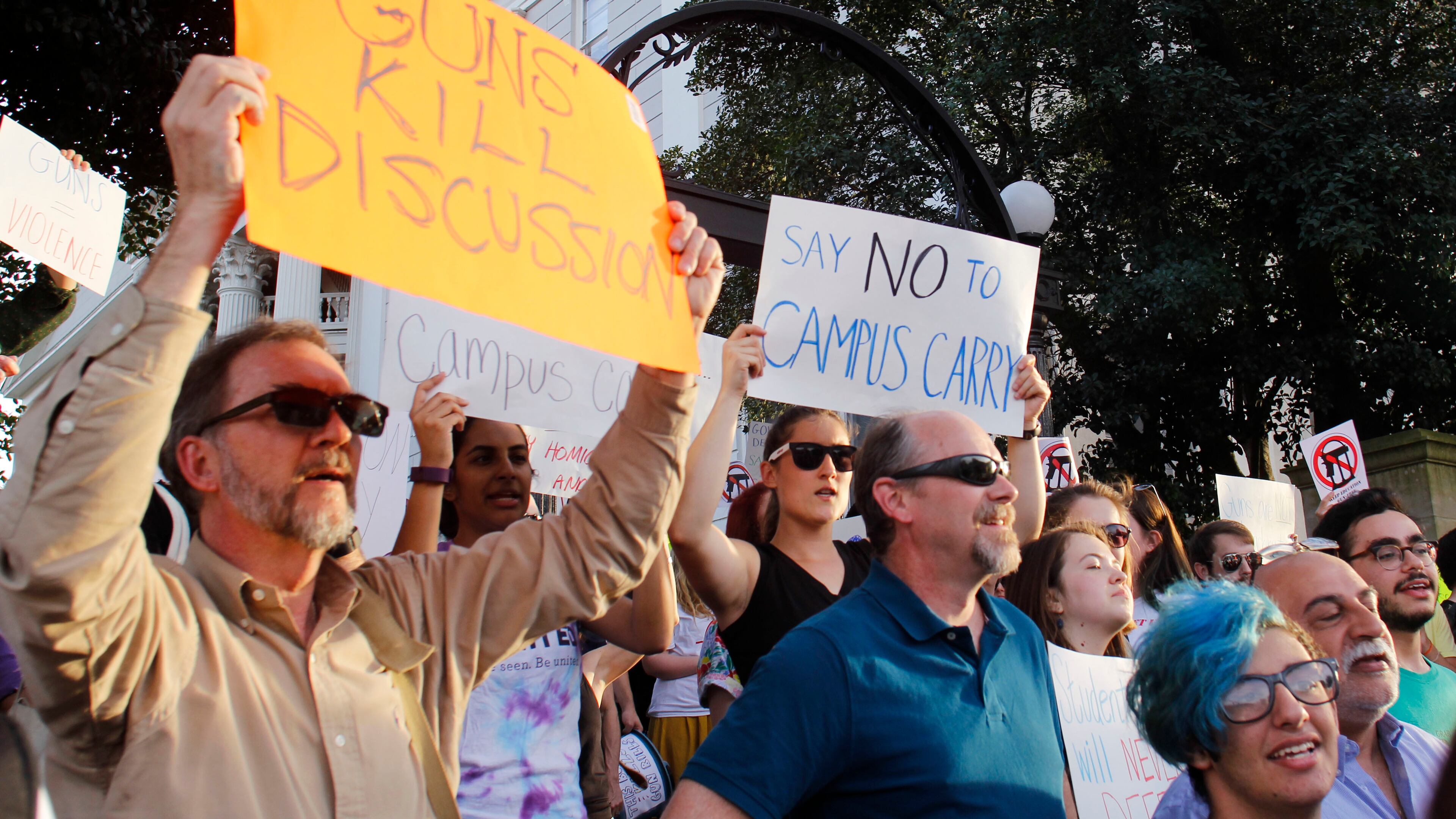As colleges figure out how to accommodate guns, parents continue to worry

In signing the campus carry bill over the objections of the Board of Regents, university faculty and students who resoundingly opposed the measure in polls, Gov. Nathan Deal has created a stressful situation for colleges required to accept guns in their midst by July 1.
The new law allows anyone with a concealed weapons permit to carry firearms on public campuses except in dormitories, fraternity and sorority houses, buildings used for athletic events, child care centers, areas where high school students attend class, offices or rooms used for disciplinary hearings, and faculty academic offices.
The bill is silent on how universities are expected to handle challenges, including gun storage. While students can bring their guns to class, student centers and dining halls, they can't bring them to their dorms so where do they store them at night? Also, students can't bring weapns to class attended by high school students taking college classes through the state's Move on When Ready program. Who keeps track of which classes among the hundreds offered each day may have a high school student?
As the AJC reported:
The law, which takes effect July 1, excludes on-campus preschools, faculty or administrative offices, disciplinary hearings and areas where high schoolers take college classes. Also off-limits to concealed weapons are dormitories, fraternity and sorority houses and buildings used for athletic events.
Lawmakers provided no instructions on how campuses should implement the law, unlike the approach Texas lawmakers used last year, which gave campuses latitude on policies, as long as they don't effectively prohibit people from carrying.Georgia joins nine other states that allow concealed weapons to be carried on campuses. Permit-holders must be at least 21.
Violations by "weapons carry license holders" are misdemeanors, punishable by $25 fines and no jail time.
I continue to hear from worried parents, among them south Georgia native Trela Haralson. Here is why she is concerned.
By Trela Haralson
As the parent of a rising ninth grader who is just starting to consider long-term education plans, my reaction to the signing of the campus carry law by the governor was one shared by many Georgia parents. I was concerned about safety.
As a graduate of the University System of Georgia, I have other concerns, as well. I grew up in Ashburn, a small town in south Georgia, and my parents held blue-collar jobs. As a high school senior with good grades and a good SAT score, I considered several colleges and universities. My final choice was between a small private university in metro Atlanta and Valdosta State College. Yes, it was a college back then. I'm telling my age.
Simply put, my family could not afford the private university, even with scholarships. Through the Valdosta State College Foundation Scholarship, I was able to attend four years at VSC tuition free, and graduate with a bachelor’s degree and not one cent of student loan debt. Upon graduation, I enrolled at the University of Georgia to study social work. A graduate assistantship allowed me to complete my master’s in social work without student loan debt.
Because of my wonderful experiences, I am fiercely loyal to the University System of Georgia. I am not wealthy, so I could never be considered a "major donor." But when students call me asking me to give to UGA or VSU, they can always count on a "yes" from me.
My niece is a high school student who is starting to look at colleges. I have encouraged her to look at the University System of Georgia. My 8th grader has already heard me sing the praises of Georgia's public colleges and universities. In fact, I took him and a friend to visit Georgia State University during their spring break because I wanted them to imagine what it would be like to attend there.
I truly believe the quality of education I received in Georgia's public higher education is every bit as good as any education I could have received at any private school in this state. I am proud to say Georgia can offer a world-class education to promising students, even if they aren't rich. Part of the benefit of attending a public college or university is the opportunity to attend classes and live in communities with students from many different geographic, ethnic, cultural and financial backgrounds.
A well-rounded education also requires that students and faculty with many different points of view come together and discuss issues and ideas. The affordability of public schools fosters this diversity of background and points of view.
The Board of Regents opposed the campus carry legislation. Campus police opposed it. I feel the University System of Georgia has been betrayed by the Georgia Legislature and the governor. With the new rules allowing guns on campus, many parents will re-consider sending their children to Georgia's public colleges and universities.
Students who don't feel comfortable sitting in a classroom with a loaded gun will look elsewhere. Professors and other instructors who present provocative ideas or who have extremely rigorous grading standards may feel safer in classrooms where students are not armed. While many families, students and instructors who favor campus carry will continue to choose Georgia's public schools, those who oppose it will choose private schools that don't allow firearms or look outside the state. This hurts the quality of higher education throughout all schools, public and private. The end result will be greater polarization and narrowing points of view.
Private, gun-free schools will have greater concentrations of "liberal, elite" students, researchers and instructors, who oppose campus carry and have the means or credentials to choose schools that prohibit it. Georgia's public colleges and universities will lose the diversity of ideas and backgrounds those students, researchers and instructors would have bought with them. The world-class education offered by the University System of Georgia will be inevitably eroded. That is deeply disappointing to me.
More Stories
The Latest



